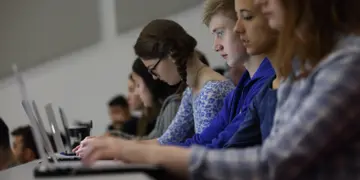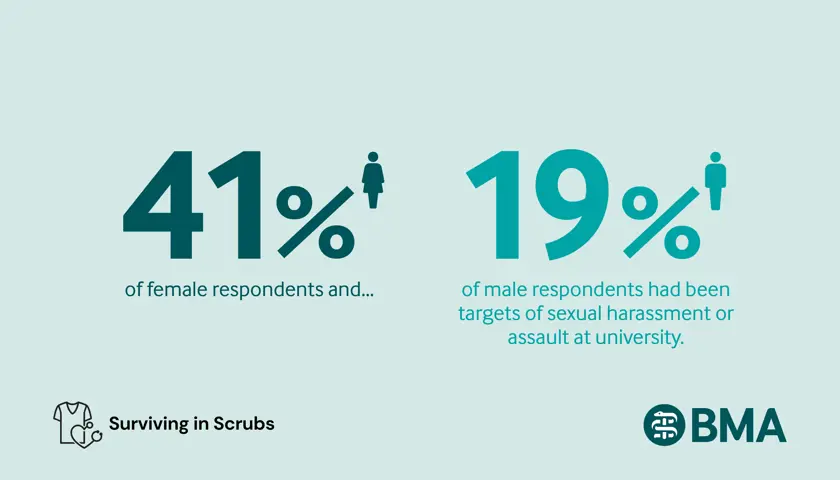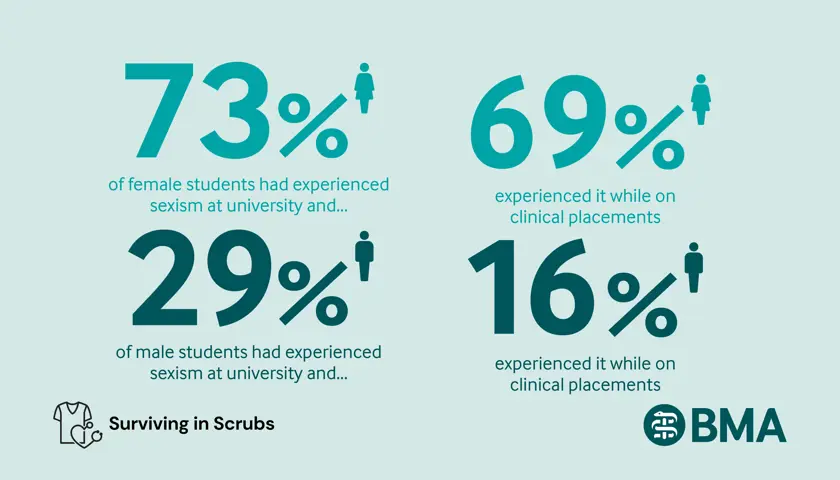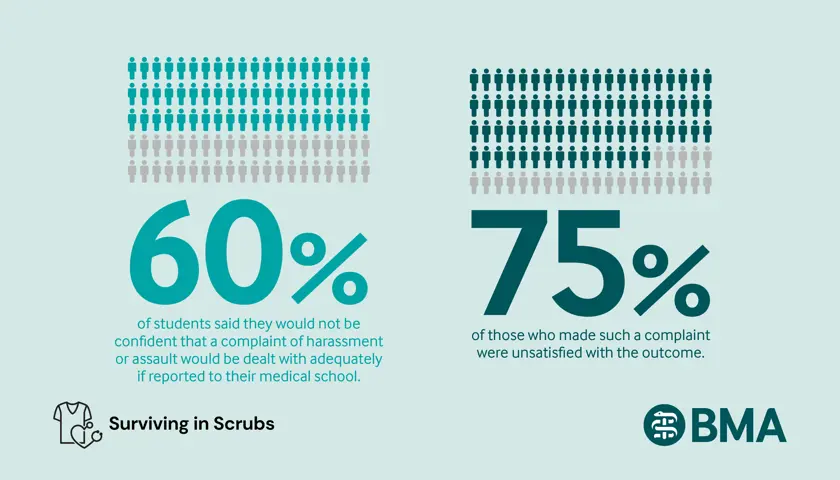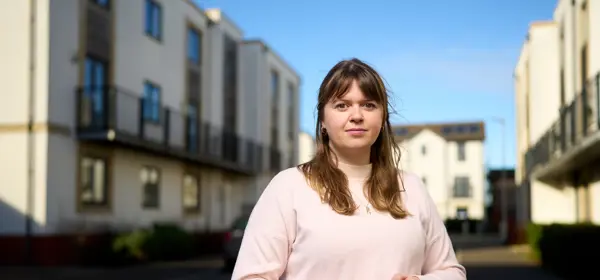Sexism rife in medical schools, finds BMA
Sexism rife in medical schools, finds BMA
41 per cent of female students and 19 per cent of male students say they have experienced sexual harassment or sexual assault at medical school, reveals report
Institutional failure by UK medical schools to address sexism and sexual violence is damaging trust and putting students at risk, a BMA report warns.
A study by the BMA has finds tolerance of gender-based discrimination within medical schools has become ‘dangerously normalised’, with the numbers of students experiencing sexual harassment and violence described as 'deeply concerning'.
The findings, which include the testimony and feedback of 968 medical students from across the UK, found that 41 per cent of female students and 19 per cent of male students said they had experienced sexual harassment or sexual assault at medical school.
20 cent of female respondents and 6 per cent of male respondents told the study that they were harassed or sexually assaulted while on clinical placement. 66 per cent of respondents had personally experienced sexism at university, including university social or extra-curricular activities.
Quoted within the report, one respondent shared their experience of being repeatedly sexually harassed by a senior doctor with whom they had been working with as part of an extracurricular committee, during their second year at medical school.
‘He would find any excuse to touch me inappropriately, including holding my waist for prolonged periods, and touching up my thigh while no one else was around,’ the student told the survey.
‘This escalated to one day putting his hand up my top. He continued to find excuses to privately message me and kept offering me opportunities to conferences or research if I was to do things like “go for a run” with him.’
The survey also heard from another student who was discouraged from reporting an incident in which a fellow medical student had touched them inappropriately on a night out.
‘When I went to report this to a senior member of staff at my university, I was told it might reflect poorly on my professionalism if I told the medical school I had been assaulted by another student but refused to reveal their identity,’ the medical student told the survey.
‘There was no way to anonymously report this, and I felt too scared to report it non-anonymously. I later ended up in classes with my assaulter because there was no anonymous reporting process.’
I was told by another medical student that he doesn’t believe women should be doctors
Anonymous survey response
The report also warns that gender-based discrimination 'particularly when coming from senior doctors and educators' has become dangerously normalised.
73 per cent of female respondents to the survey told the BMA they had experienced sexism at university while 69 per cent reported experiencing while on clinical placements, with male students reporting at 29 per cent and 16 per cent respectively.
‘One particular man in my cohort is known for being sexist,’ a student told the survey.
‘He frequently talks about how my cohort is predominantly female and “the reason why the NHS is failing”. He’s made judgemental comments at my female friends for not knowing the answer to questions and then spent the rest of the session laughing about how “let me guess, I’m mansplaining am I?” I was told by another medical student that he doesn’t believe women should be doctors.’
The report further describes how many perpetrators of sexism and sexual violence, which includes doctors, medical school staff and students, operate within environments and cultures that enable offending behaviour and in which they face little or no consequences for their actions.
Alarmingly, 60 per cent of students responding to the survey said that they would not be confident that a complaint of harassment or assault would be dealt with adequately if reported to their medical school, while 75 per cent of those who had reported stating that they had been unsatisfied with the outcome.
‘Our university allowed a repeated predator who sexual assaulted other students back onto the course,’ another student revealed to the survey.
‘The university also encouraged students who were victimised not to go to the police as it would impact their reputation.’
Other findings from the report include:
- 84 per cent of respondents believe that sexism is a problem in medical education
- 67 per cent who experienced sexual harassment or sexual assault chose not to report the incident
- 50 per cent of respondents said that sexism and sexual violence had impacted their education
Doctor and medical student advocacy group Surviving in Scrubs has spent years highlighting the scale of sexism and sexual harassment in medicine and the effect on affected individuals.
Responding to the survey, the organisation’s co-founders Becky Cox and Chelcie Jewitt said that, while its findings were sadly unsurprising, they hoped that they could serve as a wake-up call to bring an end to the corrosive cultures of misogyny and sexual violence within medicine.
They said: ‘Since the start of our campaign we have received multiple stories of sexual violence in medical schools and requests for support from students struggling raise concerns.
‘Sadly, the survey shows the appalling scale of sexual violence affecting medical students perpetrated not only by fellow students but also senior university and medical staff responsible for their training. When trying to report an incident students describe being repeatedly failed and re-traumatised by the organisations meant to protect them.
‘Having recently supported several students we have heard firsthand the poor way in which cases are handled with survivors having to continue to study alongside the perpetrator, concerns dismissed without investigation, and perpetrators retaliating against survivors.’
They added: ‘We are calling on all organisations involved in medical education to commit to end misogyny and sexual violence affecting medical students. Our medical schools, NHS clinical placement providers and regulators must be accountable. They must provide specialist support for survivors, hold perpetrators to account, and prevent sexual violence through education and culture change.’
Sexism and sexual violence remain pervasive within medical schools, deep-rooted within the culture of academia and throughout clinical placements
Ria Bansal and Akshata Valsangkar
Warning that the current climate is eroding trust and putting students at risk, the report sets out a broad range of recommendations aimed at challenging institutionalised gender discrimination and ensure that victims of sexual harassment and violence are adequately supported.
Measures include requiring universities to adopt a zero-tolerance approach to sexual violence and nationally recognised and robust sanctioning guidelines, and for medical schools to review their fitness to practise guidance to ensure it can effectively address such issues.
The report also calls for medical schools and clinical placement providers to take steps to minimise interactions between complainants and those accused of sexual misconduct and to provide multiple channels for reporting sexual harassment.
It also urges medical schools to provide active bystander training to all students and staff and to provide greater support to students wishing to enter medical specialties that have notable gender disparities.
The BMA is further calling for universities and medical schools to conduct sexual violence-based risk assessments, and for the Government to bring forward new laws that would impose a statutory duty of care to students on all higher education institutions.
The report follows on from similarly damning findings in a 2022 paper published in the Royal College of Surgeons England bulletin Sexual Assault in Surgery: A Painful Truth.
Co-authored by Becky Fisher and Simon Fleming, the paper exposed the shocking prevalence of sexism and sexual assault within the specialty, while outlining calls for change.
Responding to the report in a jointly written blog, BMA medical student committee welfare co-chairs Erin Maccabe and Gerald Herman said that the survey highlighted why urgent change was needed.
They said: ‘Sexism and sexual violence remain deeply concerning issues within medical education.
‘[These] results reflect an uncomfortable truth: not only are patients and doctors perpetrating these acts, but also other students – particularly incidents involving sexual assault and harassment. This highlights an urgent need for targeted action, tackling the issues at both their individual and institutional roots.
‘It is essential that all medical students receive a meaningful education on sexism, misogyny, relationships, consent, and sexual violence. This should not be a tick-box exercise but a means of empowering these students to recognise, report and call out harmful behaviours in academic, professional and personal settings.
‘We are also calling for institutional reform. Medical schools’ reporting and investigatory procedures must be varied, adhere to national standards and effectively hold perpetrators accountable.’


